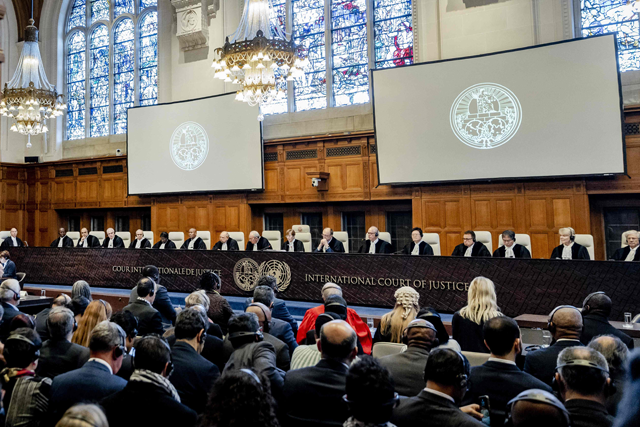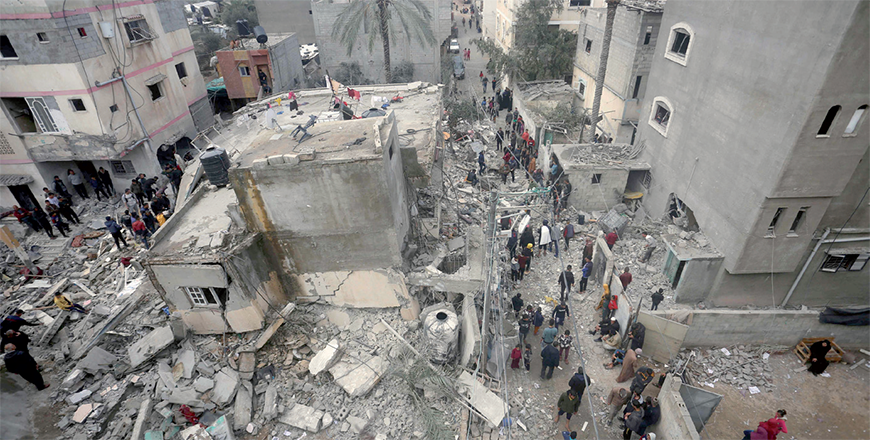You are here
Blinken in Israel for talks on truce deal
By AFP - Feb 08,2024 - Last updated at Feb 08,2024
TEL AVIV — US Secretary of State Antony Blinken was in Israel on Wednesday, where he was expected to press for what he called an "essential" truce agreement as the war with Hamas entered its fifth month.
The diplomat meet Israel's leaders as part of a Middle East crisis tour after earlier stops in Saudi Arabia, Egypt and Qatar.
Qatar, which mediated a temporary ceasefire earlier in the conflict, said Hamas had given a response to a new proposed deal to pause the fighting.
"The reply includes some comments, but in general it is positive," Qatari Prime Minister Mohammed Bin Abdulrahman Al Thani said after meeting Blinken in Doha.
Hamas confirmed it delivered its response to proposals hammered out a week ago in Paris between Qatar and other mediators.
Blinken said Hamas's reply had been "shared" with Israel and he would discuss it there on Wednesday.
He also said there was still "a lot of work to be done" but that he believed "that an agreement is possible and indeed essential".
Israel's spy agency Mossad also received the Hamas response, prime minister Benjamin Netanyahu's office said, and "its details are being thoroughly evaluated".
Netanyahu, who has yet to comment directly on the response, said on Tuesday: "We are on the way to the total victory and we will not stop."
Pressure for a ceasefire has mounted as Israeli forces push towards the town of Rafah on Gaza's southern border with Egypt, where more than half the besieged territory's population has taken shelter.
"To be clear, intensified hostilities in Rafah in this situation could lead to large-scale loss of civilian lives, and we must do everything possible within our power to avoid that," said Jens Laerke, spokesperson for the UN aid coordination office OCHA.
Vowing to eliminate Hamas, Israel has launched air strikes and a land offensive that have killed at least 27,585 people in Gaza, mostly women and children, according to the health ministry in the territory.
The campaign has devastated swathes of Gaza, destroyed hospitals and displaced half of its population of 2.4 million, while food, water, fuel and medicine are in dire shortage.
Heavy strikes and fighting continued on Tuesday, with Gaza’s health ministry saying at least 107 people were killed in 24 hours, including six policemen securing an aid truck in Rafah.
“I was in front of my house, sitting next to this shop, I saw a police car passing by and suddenly it exploded,” said a Palestinian man who described witnessing the strike. “I couldn’t hear anything because of the intensity of the explosion.”
Israel has warned it could push on into Rafah as it pursues the fighters.
Safia Marouf, who sought refuge in Rafah with her family after being uprooted from their home further north, said she is afraid of what is to come.
“The children are scared all the time, and if we want to leave Rafah, we don’t know where to go. What will be our destiny and that of our children?”
Diplomatic push
After meeting Blinken in Doha, the Qatari premier said he was “optimistic” about the truce, but declined to discuss Hamas’s reply in detail, citing the “sensitivity of the circumstances”.
Last week, a Hamas source said the proposed truce calls for a six-week pause to fighting for a hostage-prisoner exchange, as well as more aid for Gaza.
On Monday, Netanyahu said Hamas had presented “demands that we will not accept” for an exchange involving thousands of prisoners.
The Israeli leader is under pressure to end the war and bring the hostages home, amid divisions within his Cabinet and public fury over the fate of the remaining captives.
Israeli forces, with air and naval support, have been engaged in heavy combat centred on Gaza’s main southern city of Khan Yunis, the hometown of Hamas’s Gaza chief, Yahya Sinwar, accused by Israel of masterminding the October 7 sudden attack.
The United States has strongly backed Israel with munitions and diplomatic support but also urged steps to reduce civilian casualties.
“The humanitarian situation in the Gaza Strip is beyond catastrophic,” said Tommaso Della Longa, spokesman for the International Federation of Red Cross and Red Crescent Societies.
Around 8,000 displaced people had been evacuated from the besieged Al Amal hospital in Khan Yunis, where they had sought refuge, after weeks of heavy shelling and fighting nearby, he added.
Related Articles
THE HAGUE — The UN's top court on Friday said Israel must do all it can to prevent genocide in its war with Hamas and allow aid into Gaza, a
GAZA CITY, Palestinian Territories — Israel continued with its attack on Gaza on Monday, including in far-southern Rafah, despite US warning
GAZA STRIP, Palestinian Territories — Mediator Qatar acknowledged on Saturday that prospects for a new pause in Israel's war with Hamas were


















